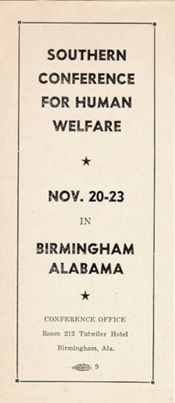1938 Southern Conference for Human Welfare meeting
The 1938 Southern Conference for Human Welfare meeting was a landmark political meeting held in Birmingham from Sunday November 20 to Wednesday November 23, 1938. It was organized by the Birmingham-based Southern Conference for Human Welfare.
Publicity for the meeting heralded that, "the Conference, by providing a meeting ground for all Southern progressives, will promote mutual trust and cooperation between them for greater service to the South.” Fisk University sociologist Charles Johnson reported that the 1,200-plus attendees were a "curiously mixed body which included labor leaders and economists, farmers and sharecroppers, industrialists and social executives, government officials and civic leaders, ministers and politicians, students and interested individuals. Guests of honor included First Lady Eleanor Roosevelt, U.S. Supreme Court Justice Hugo Black, and Governor Bibb Graves. Also among the attendees, a fourth of whom were African-American, were the Works Progress Administration's Aubrey Williams, educator Mary McLeod Bethune, Avondale Mills president Donald Comer, Methodist minister James Dombrowski, Senator Claude Pepper, and SCHW co-founder Virginia Durr.
Proceedings
- Sunday, November 20:
- 3:00 PM: Registration at the Tutwiler Hotel and motorcade tour of the city, courtesy of the Women's Civic Club
- 7:30 PM: Open meeting at Municipal Auditorium with an address by Dr Frank P. Graham
- Monday, November 21:
- 9:00 AM: Registration at Municipal Auditorium
- 10:00 AM: General session at Municipal Auditorium
- 11:00 AM: "Credit" session at the Tutwiler Hotel
- 2:00 PM: "Farm Tenancy" session at Municipal Auditorium
- 2:00 PM: "Constitutional Rights" session at First Christian Church
- 2:00 PM: "Education" session at First Methodist Church
- 7:30 PM: "Labor Relations" session at Municipal Auditorium
- 7:30 PM: "Prison Reform" session at the Tutwiler Hotel
- 7:30 PM: "Housing" session at Smithfield Court housing project
- Tuesday, November 22:
- 9:00 AM: "Suffrage" session at Municipal Auditorium
- 9:00 AM: "Race Relations" session at First Methodist Church
- 9:00 AM: "Women Wage Earners" session at the Tutwiler Hotel
- 9:00 AM: "Freight Rates Differentials" session at the Tutwiler Hotel
- 2:00 PM: "Youth Problems" session at Municipal Auditorium
- 2:00 PM: "Labor Relations" executive session at 6th Avenue Presbyterian Church
- 2:00 PM: "Constitutional Rights" executive session at First Christian Church
- 7:30 PM: Address by Eleanor Roosevelt at Municipal Auditorium
- 10:00 PM: "Suffrage" executive session at the Tutwiler Hotel
- Wednesday, November 23:
- 9:00 AM: "Health" session at Municipal Auditorium
- 9:00 AM: "Farm Tenancy" executive session at First Methodist Church
- 9:00 AM: "Child Labor" session at the Tutwiler Hotel
- 1:30 PM: General session at Municipal Auditorium
- 7:30 PM: Thomas Jefferson Medal presentation (William E. Dodd presented the medal to Hugo Black)
Impressions
Charles Johnson gave his impressions of the meeting in a contemporary articles for The Crisis. He reported that the conference's strategy of combining sessions on labor relations, social work and race relations was sound, but that the tense climate regarding race in Birmingham led that issue to overshadow others. So while participants in the labor session could largely agree that racial justice was needed to begin to address regional inequity in labor conditions, another session on race relations bogged down over discussion of the Costigan-Wagner anti-lynching bill. Mrs Roosevelt castigated Congressman Luther Patrick in person for his opposition to the bill. He concluded that the highlighting of race issues reflected the reality that "any movement aiming at social reconstruction in the South" would first have to confront racial inequality.
Johnson was intrigued by the spirit with which the liberal-minded conference delegates challenged Birmingham's segregation ordinances. He described "riot squads" enforcing segregated seating at the city's auditorium. In Durr's account, Birmingham Commissioner of Public Safety Bull Connor interrupted Monday's general session and instructed attendees not to "segregate together". He oversaw the relocation of white and African American attendees to opposite sides of the aisle. In a well-remembered act of defiance, Mrs Roosevelt pulled her chair into the middle of the aisle. The conference went on to draft a formal protest against such police actions and resolved not to meet again in any city where such ordinances were in effect.
References
- "Southern Conference for Human Welfare" program (1938). typescript. collection of Patrick Cather.
- Johnson, Charles S. (January 1939) "More Southerners Discover the South" The Crisis. Vol. 46, No. 1, pp. 14-15
- Krueger, Thomas A. (1967) And Promises to Keep: The Southern Conference for Human Welfare, 1938-1948. Nashville: Vanderbilt University Press
- Woodham, Rebecca (October 31, 2012) "Southern Conference for Human Welfare (SCHW)" Encyclopedia of Alabama - accessed March 11, 2014
External links
- Interview with Virginia Durr on the first Southern Conference for Human Welfare
